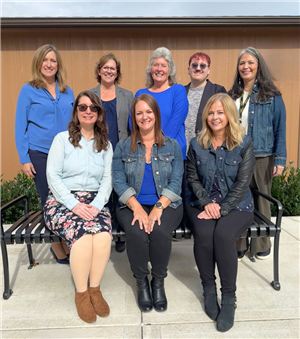- Auburn School District
- Student Engagement Services
I'm looking for...
Student Engagement Services
Page Navigation
-
Welcome to the Office of Student Engagement Services

Top Row: Tami Petrina, Rhonda Larson, Tana Casad, Seth Farison, Robin Pratt
Bottom Row: Tina Werden, Ashley Boyd, Christine Clark-GustafsonOur Team:
Rhonda Larson, Assistant Superintendent for Family Engagement and Student SuccessTami Petrina, Executive Director of Early Learning and Student Special ServicesAshley Boyd, Assistant Director of Prevention and Intervention ServicesRobin Pratt, Coordinator for Native American Education ProgramsChristine Clark-Gustafson, Truancy LiaisonSeth Farison, Community Coalition CoordinatorTana Casad, Executive Administrative AssistantTina Werden, Administrative AssistantContact Phone Number: 253-931-4712The Auburn School District is committed to building strong student, family and community relationships and partnerships. Our office strives to create space, and systems, for this to occur.Research is clear--families engaged in the educational processes of their children create a positive impact with indicators in:- Overall school attendance;
- Achieve higher grades, achievement test scores;
- Lower drop-out rates, higher rates of graduation;
- Students' sense of personal competence and efficacy for learning;
- Students' beliefs about the importance of education, and
- Students who go on to earn more advanced degrees than disengaged families.
Our office aspires to support connections between schools and families, creating conditions for promoting family engagement. Our strategies build on existing research suggesting that partnerships between home and school can only develop and thrive if both families and staff have the requisite collective capacity to engage in partnership.Following are the objectives:- Relationship-building: The school staff builds productive, personal relationships with parents of all students.
- Communication: Two-way information in many forms flows regularly between school staff and parents about students' academic achievement and individual needs.
- Decision-making: School staff encourages, supports and expects parents to be involved in school improvement decisions and to monitor and assist school improvement.
- Advocacy: For each student, the school staff identifies and supports a parent or other adult who can take personal responsibility for understanding and speaking for that child's learning needs.
- Learning Opportunities: The school staff ensures that families have multiple opportunities to understand how to support their children's learning.
- Community Partnerships: The school staff engages and partners with community members to plan and implement substantive work to improve student achievement.

